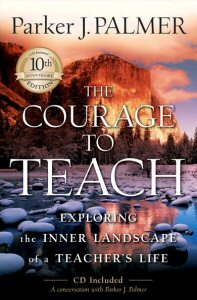
Exploring the Inner Landscape of a Teacher's Life
by Parker Palmer (1998/2007)
I recently received this book for my birthday and couldn't be happier. Parker Palmer's (1998/2007) book has come up in many conversations over the past year with colleagues and I knew the text would feed my teacher self. The opening chapter is entitled "The Heart of a Teacher. Identity and Integrity in Teaching" In it, Palmer talks about "connectedness" as an attribute and goal teachers should strive towards:
"Good teachers possess a capacity for connectedness. They are able to weave a complex web of connections among themselves, their subjects, and their students so that students can learn to weave a world for themselves. [...] The connections made by good teachers are held not only in their methods but in their hearts--meaning heart in its ancient sense, as the place where intellect and emotion and spirit and will converge in the human self" (p. 11).
Earlier, Palmer describes the imbalance that can occur when teachers focus on only one of three major "path(s)" (i.e., intellectual, emotional, and spiritual) of their teaching identity:
"Reduce teaching to intellect, and it becomes a cold abstraction; reduce it to emotions, and it becomes narcissistic; reduce it to the spiritual, and it loses its anchor to the world. Intellect, emotion, and spirit depend on one another for wholeness" (p. 5)
This observation really resonated with me. Over the years, I've seen myself try to develop one aspect, while recognizing, somewhat uncomfortably, that other aspects of my teacher identity become neglected in the process. Palmer gives us teachers permission to integrate all sides of our selves into our practice in a holistic, meaningful way.
A similar point that spoke to me was Palmer's discussion of the inherent public-private nature of teaching (see p. 18). He might be overstating when he says that teachers are one of the few professionals called to reside in both private and public worlds, but I think there is no denying that connecting our inner and outer lives makes us teachers better at helping our students to connect knowledge meaningfully. The challenge of honoring and balancing our intellectual, emotional and spiritual selves is immense, but I believe is a necessary goal we should try to shoot for in our daily classroom life.
There's so much more to say about this book's first chapter. The writing--including the choice of metaphors and the personal stories that serve to illustrate Palmer's various points--is engaging and flows beautifully. I can't wait to read more.
As for the coming fall, I'm looking forward to incorporating the book (at least the first chapter) into my graduate seminar on teaching German as a foreign language. I think it will serve as a beautiful reminder of why we teach, and who we are and hope to become as teachers.
To all my friends and colleagues who have recommended this book to me, thank you! Looking forward to more stimulating conversations about it in the coming months!
 RSS Feed
RSS Feed